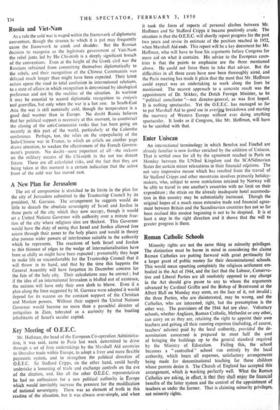Key Meeting of 0.E.E.C.
Mr. Hoffman, the head of the European Co-operation Administra- tion, it was said, came to Paris last week determined to drive through a set of firm undertakings by the Marshall Aid countries to liberalise trade within Europe, to adopt a freer and more flexible payments system, and to strengthen the political direction of 0.E.E.C. Sir Stafford Cripps, on the other hand, could hardly undertake a loosening of trade and exchange controls on the eve of the election, and, like all the other 0.E.E.C. representatives he had no enthusiasm for a new political authority in Europe which would inevitably increase the pressure for the modification of national sovereignty. There was an element of truth in this reading of the situation, but it was always over-simple, and when it took the form of reports of personal clashes between Mr. Hoffman and Sir Stafford Cripps it became positively crude. The situation is that the 0.E.E.C. will shortly report progress for the past two years and revise its estimate of the position reached in 1952, when Marshall Aid ends. This report will be a key document for Mr. Hoffman, who will have to base his arguments before Congress for more aid on what it contains. His advice to the European coun- tries is that the points to emphasise are the three mentioned above. He could not force them to take that advice. But the difficulties in all three cases have now been thoroughly aired, and the Paris meeting has made it plain that the most that Mr. Hoffman could expect was an undertaking to work along the lines he mentioned. The nearest approach to a concrete result was the appointment of Dr. Stikker, the Dutch Foreign Minister, to be "political conciliator "—not director-general, as was first hoped. It is nothing spectacular. Yet the 0.E.E.C. has managed so far to put Marshall Aid to good use in avertiog breakdown and starting the recovery of Western Europe without ever doing anything spectacular. It looks as if Congress, like Mr. Hoffman, will have to be satisfied with that.


































 Previous page
Previous page